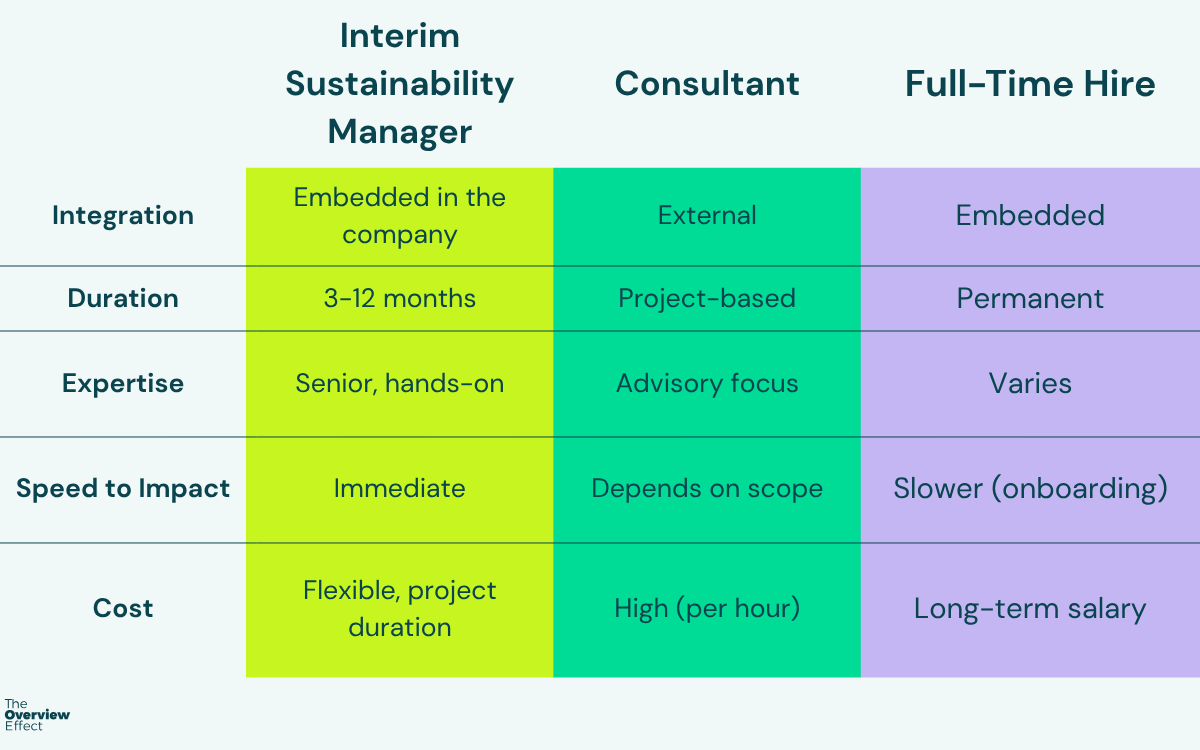
At a Glance
- Interim sustainability managers are experts who step into organizations temporarily (3–12 months) to lead sustainability projects.
- Dutch companies are turning to them due to tight regulatory deadlines (EUDR, CSDDD), talent shortages, and the need for flexibility
- They offer a middle ground between consultants and full-time hires, embedded in the team but without long-term overhead.
- Key benefits: fast onboarding, cost efficiency, credible expertise, and immediate impact.
- Particularly valuable in manufacturing, chemicals, retail, logistics, and construction.
- Many leave behind lasting systems and cultural change, not just short-term fixes.
Introduction: The Rise of Interim Roles in Sustainability
Across the Netherlands, sustainability has shifted to a boardroom priority. Regulations like the Corporate Sustainability Due Diligence Directive (CSDDD) and the EU Deforestation Regulation (EUDR) are reshaping how businesses operate. At the same time, customers, investors, and employees expect meaningful climate action, not just promises.
This mounting pressure leaves companies with a dilemma: how to deliver on ESG and sustainability goals when the right expertise is scarce?
The answer for many organizations is the interim sustainability manager. Rather than waiting months to hire permanent staff or relying solely on external consultants, businesses are increasingly turning to experienced interim professionals who can step in quickly, bring credibility, and keep projects moving.
What Is an Interim Sustainability Manager?
An interim sustainability manager is a senior professional who temporarily steps into a company to lead or support sustainability strategy, reporting, or transformation projects.
Unlike a traditional consultant, who often provides advice from the outside, an interim manager works within the organization. They integrate into teams, build relationships, and drive implementation.
Key differences:
- Interim sustainability manager: Embedded in the company, often full-time for 3–12 months, leading projects and teams.
- Interim sustainability consultant/freelance sustainability consultant: Provides specialist expertise, often part-time or project-based.
- Permanent hire: Long-term employee with responsibility for sustainability function.
This flexibility makes interim managers particularly valuable for organizations navigating transitions, regulatory deadlines, or sudden talent gaps.
Why Companies Hire Interim Sustainability Managers
1. Compliance Deadlines Are Closing In
The EUDR requires companies to prove their supply chains are free of deforestation (along with many other requirements). The CSDDD will demand detailed human rights and environmental due diligence. These obligations don’t wait for perfect hiring cycles. An interim sustainability manager can step in immediately to prepare data, engage suppliers, and avoid compliance risks.
2. Urgent Expertise for Complex Projects
Decarbonization roadmaps, ESG data collection, and circular economy strategies require highly specific expertise. A temporary ESG expert with the right background can accelerate progress where internal teams lack experience.
3. Covering Leadership Gaps
Parental leave, career transitions, or sudden resignations can leave companies exposed. Rather than pausing critical sustainability work, organizations bring in an interim manager to help maintain momentum.
4. Flexibility and Cost Efficiency
Hiring a permanent head of sustainability can take 6–12 months and a significant budget. Interim roles offer flexibility: companies pay for expertise when needed, without long-term overhead.

Industries Where Interim Managers Add Value
Certain industries are under pressure to adapt quickly.
Interim sustainability managers are particularly valuable in:
- Manufacturing – Decarbonization and resource efficiency.
- Consumer goods & retail – Supply chain traceability for EUDR and human rights.
- Chemicals – Compliance with strict EU environmental standards.
- Construction – Emissions reduction and circularity requirements.
- Logistics – Electrification and scope 3 emissions management.
How to Choose the Right Interim Manager
Not every interim professional will fit your organization. Decision-makers should consider:
- Expertise – Do they have the right technical knowledge (e.g., climate transition plan, decarbonization, supply chain)?
- Adaptability – Can they embed quickly into your company culture?
- Seniority – Can they operate at board level while managing day-to-day delivery?
- Track Record – Have they delivered similar interim roles in your sector?
The right choice combines credibility with pragmatism: someone who can both design strategy and execute.
The Dutch Context
The Netherlands faces a sustainability talent shortage. Demand for experienced professionals far outweighs supply, particularly in industries facing urgent compliance deadlines.
Companies that wait for permanent hires risk falling behind. By contrast, engaging an interim sustainability consultant allows organizations to stay ahead of regulation, maintain credibility with stakeholders, and build internal capacity over time.
The Dutch market presents unique conditions that make interim sustainability management particularly valuable:
Regulatory Leadership Position
The Netherlands often implements EU sustainability regulations ahead of required timelines, creating immediate compliance pressure. Dutch companies operating internationally face complex, overlapping regulatory requirements that demand specialized expertise.
Sustainability Talent Shortage
The Challenge: Global demand for green skills grew by 11.6% between 2023 and 2024, double the 5.6% growth in supply, according to LinkedIn’s research. In the Netherlands, sustainability advisors and environmental project leaders are among the most in-demand professionals, with traditional hiring processes taking 6+ months for senior roles.
The Impact: Traditional hiring processes can take 6+ months for senior sustainability positions, with competition driving salary inflation and reducing candidate quality.
The Solution: Interim managers provide immediate access to senior expertise while permanent recruitment continues, reducing time-to-value and competitive pressure.
Corporate Sustainability Maturity
Companies are generally sophisticated sustainability users who understand the strategic value of ESG initiatives. This maturity means they can effectively leverage interim expertise without extensive capability building.
Economic Pragmatism
Current economic uncertainty makes Dutch companies particularly appreciative of the flexibility that interim arrangements provide. With access to senior expertise without permanent financial commitments.
Hypothetical Case Example:
Imagine a mid-sized manufacturer in the east of the Netherlands. With the EUDR deadline approaching, the company must prove that its raw materials are deforestation-free.
Their sustainability manager resigns, leaving the business vulnerable. Recruiting a replacement could take 9 months. Instead, the company brings in an interim sustainability manager with supply chain expertise.
Within weeks, the interim professional engages suppliers, implements due diligence systems, and prepares the board for compliance. By the time a permanent hire is made, the company has avoided fines and reputational risk and gained valuable processes to hand over.
Conclusion: Flexible Solutions for a Critical Decade
Sustainability challenges are accelerating. Waiting for the perfect permanent hire is no longer an option for many Dutch companies. The interim sustainability manager has become a critical bridge by delivering expertise, credibility, and impact when it matters most.
At the same time, interim support isn’t just about plugging a gap. It can also serve as a testing ground for new approaches, a way to upskill existing teams, and an opportunity to bring in fresh perspectives that challenge business-as-usual. Many organizations find that interim managers leave behind more than just completed projects. They embed systems, processes, and cultural shifts that last well beyond their contract.
For companies in the Netherlands navigating regulatory deadlines, talent shortages, and rising stakeholder expectations, this flexibility is invaluable. Interim sustainability managers help organizations stay compliant, maintain momentum, and build resilience in a fast-changing landscape.
FAQs: Interim Sustainability Managers
They step into a company temporarily to lead sustainability projects, ensure compliance, and drive climate action until permanent solutions are in place.
An interim manager works inside the organization, managing teams and implementation. Consultants provide advice but are usually less embedded.
Typical contracts last 3–12 months, depending on project scope and internal hiring timelines.
Manufacturing, consumer goods, chemicals, retail, construction, and logistics are seeing the highest demand.